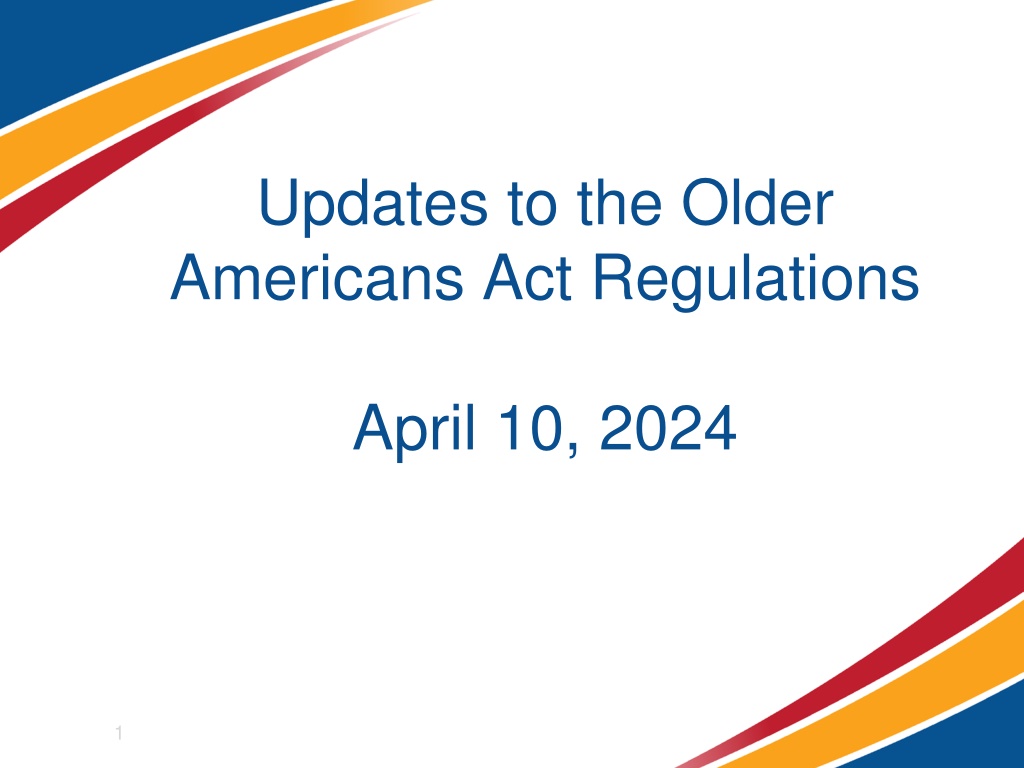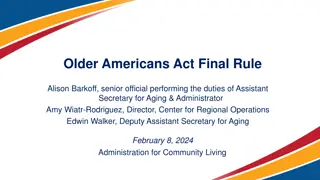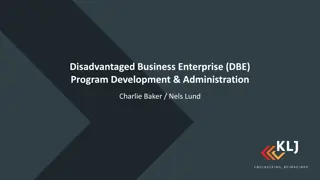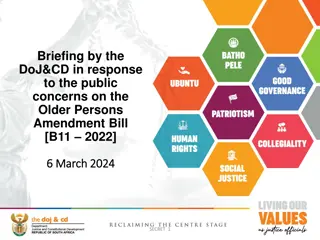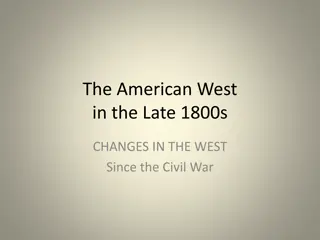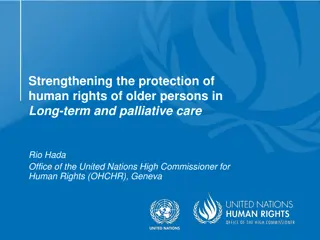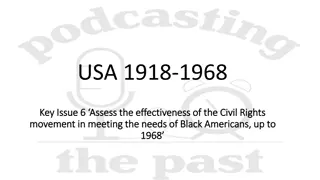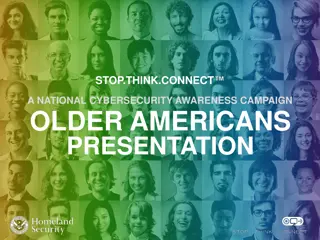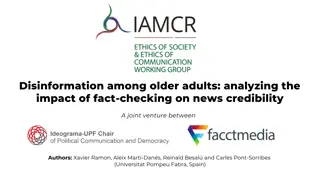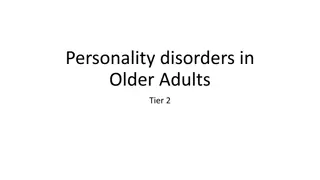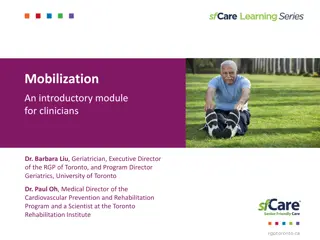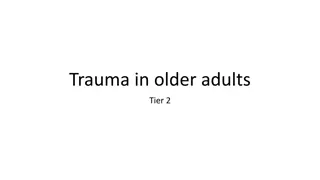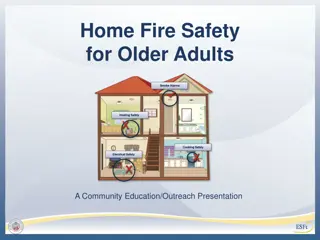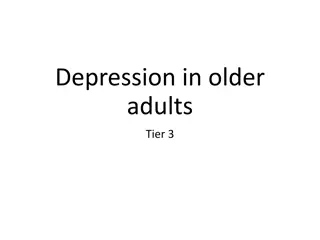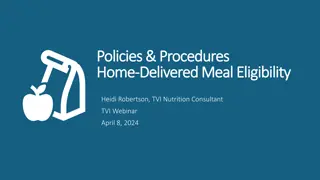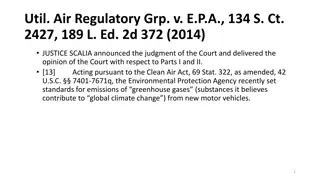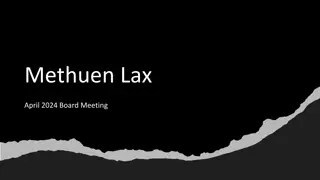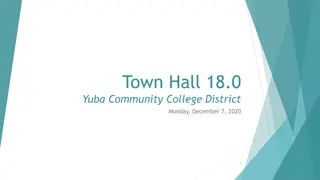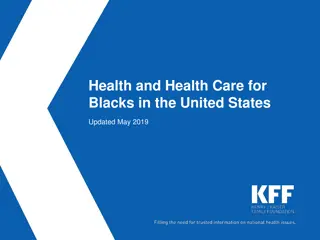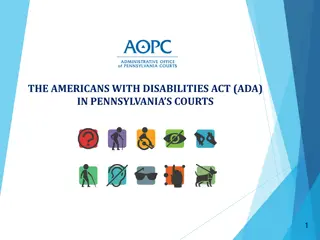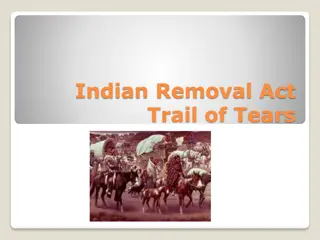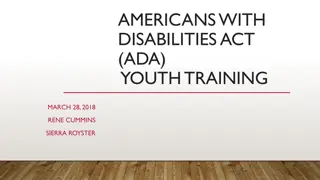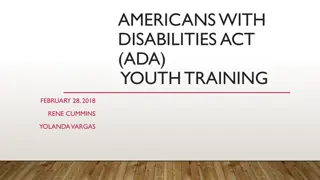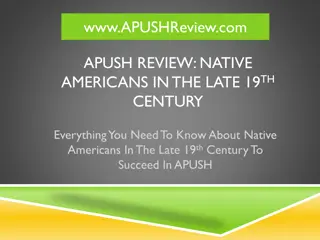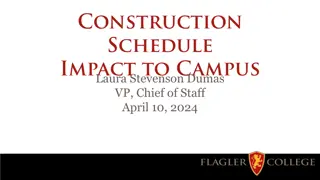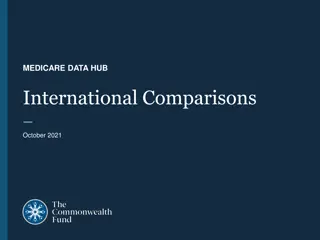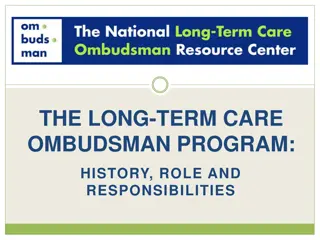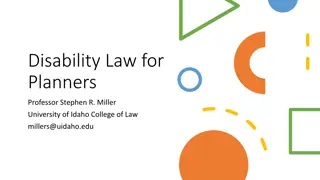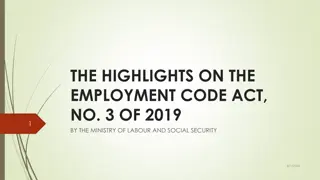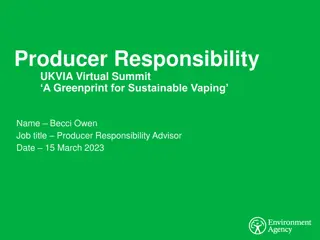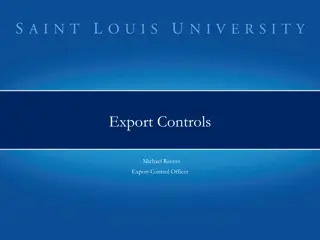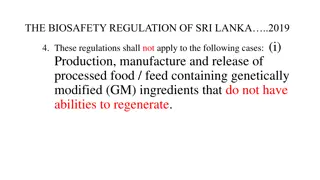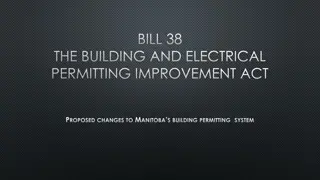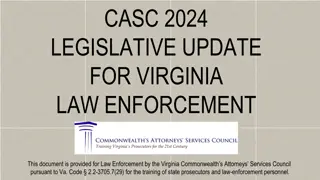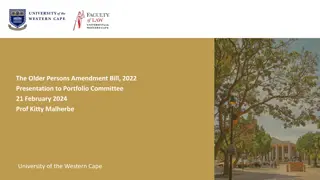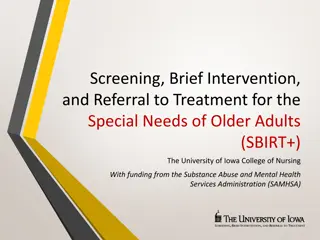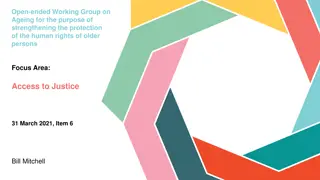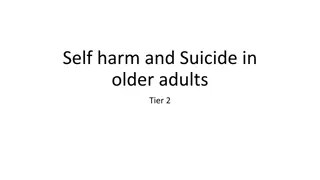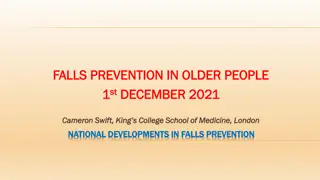Updates to the Older Americans Act Regulations - April 10, 2024
The Older Americans Act regulations were updated to align with current statutes, address the needs of older adults, promote resource stewardship, clarify program requirements, and support the aging network. Effective and compliance dates are set, emphasizing technical assistance for implementation. The final rule largely reaffirms existing OAA requirements. Stakeholders are encouraged to engage and prepare for the changes.
Download Presentation

Please find below an Image/Link to download the presentation.
The content on the website is provided AS IS for your information and personal use only. It may not be sold, licensed, or shared on other websites without obtaining consent from the author. Download presentation by click this link. If you encounter any issues during the download, it is possible that the publisher has removed the file from their server.
E N D
Presentation Transcript
Updates to the Older Americans Act Regulations April 10, 2024 1
What are we going to talk about today? Background of the Older Americans Act and the regulations. Changes made with these regulation updates What do YOU need to do next? 2
Some Quick Reminders about Rules 3 branches of Government. Legislative: makes the law Executive: implements the law Judicial: reviews the law 3
Remember regulations are the muscle on the skeleton! Without Regs With Regs 4
Purpose of the Final Rule Updating the OAA Regulations Update regulations to align with the current statute Reflect the needs of today s older adults Promote appropriate stewardship of OAA resources Clarify programmatic requirements Support the national aging network that delivers OAA services Improve program implementation to better serve older adults and caregivers 5
Effective and Compliance Dates Effective Date: 30 days after publication in the Federal Register, or March 15, 2024. Compliance Date: October 1, 2025. As the final rule goes into effect, we look forward to providing technical assistance and engaging with stakeholders regarding implementation of the final rule. For State Units on Aging (SUAs) that are unable to meet the October 1, 2025 compliance date, ACL will have a supportive corrective action process in place. 6
General Note on the OAA Final Rule The vast majority of what is included in the final rule are long-established OAA requirements i.e., reaffirming what is in statute, prior regulations, or existing policies rather than new requirements. 7
Things to keep in mind 1. You are probably already doing most of this. 2. You know your program the best. 3. We are going to be doing more trainings and we are always here to help! 8
Where can I find the regulations? You can find the full text of final rule here. Updates to Title VI start on page 11681. Updates to Title III start on page 11572. 9
What is expected of YOU with this final rule? The final rule requires you to develop policies and procedures . 1322.13 Policies and procedures. The Tribal organization and Hawaiian Native grantee shall ensure the development and implementation of policies and procedures, including those required as set forth in this part. 10
Establishing a Title VI Director 1322.13 (a): Upon approval of a program application and acceptance of funding, the Tribal organization or Hawaiian Native grantee must appoint a Title VI Director and provide appropriate contact information for the Title VI Director consistent with guidance from the Assistant Secretary for Aging. 11
Data Collection 1322.13 (b): The Tribal organization or Hawaiian Native grantee shall provide the Assistant Secretary for Aging with statistical and other information in order to meet planning, coordination, evaluation and reporting requirements in a timely manner and shall ensure policies and procedures are aligned with periodic data collection and reporting requirements, including ensuring service and unit definitions are consistent with definitions set forth in these regulations, policy guidance, and other information developed by the Assistant Secretary for Aging. 12
Data Collection Cont. What does this mean .? Have you completed your PPR? This is the requirement for you to have a procedure for completing your annual Title VI report. 13
Direct Services 1322.13(c): Requirements for client eligibility, periodic assessment, and person-centered planning, where appropriate; Access to information and assistance to minimally address: (A) Establishing or having a list of all services that are available to older Native Americans in the service area; (B) Maintaining a list of services needed or requested by older Native Americans; (C) Providing assistance to older Native Americans to help them take advantage of available services; (D) Working with agencies, such as area agencies on aging and other programs funded by Title III and Title VII as set forth in 1321.53 and 1321.69 of this chapter, to facilitate participation of older Native Americans; and (E) A listing and definitions of services that may be provided by the Tribal organization or Native Hawaiian grantee with funds received under the Act. 14
Direct Services cont. (iii) Limitations on the frequency, amount, or type of service provided; and (iv) The grievance process for older individuals and family caregivers who are dissatisfied with or denied services under the Act. 15
Questions Do you have a list of the services you provide? Do you know your eligibility requirements? (remember these are in your application) Do you have definitions for your services? (remember we have Title VI definitions) 16
Fiscal policies 1322.13(c): Voluntary contributions. Voluntary contributions, where: (A) Each Tribal organization or Hawaiian Native grantee shall: (1) Provide each older Native American with a voluntary opportunity to contribute to the cost of the service; (2) Protect the privacy of each older Native American with respect to their contribution; (3) Establish appropriate procedures to safeguard and account for all contributions; (4) Use all voluntary contributions to expand comprehensive and coordinated services systems supported under this part, while using voluntary contributions provided for nutrition services only to expand nutrition services, consistent with 1322.27. 17
Fiscal Policies Cont. 1322.13(c): Each Tribal organization or Native Hawaiian grantee may develop a suggested contribution schedule for services provided under this part. In developing a contribution schedule, the Tribal organization or Native Hawaiian grantee shall consider the income ranges of older Native Americans in the service area and the Tribal organization's or Hawaiian Native grantee's other sources of income. However, means tests may not be used. 18
Fiscal Policy Cont. ****Please note*** 1322.13(c): A Tribal organization or Hawaiian Native grantee that receives funds under this part may not deny any older Native American a service because the older Native American will not or cannot contribute to the cost of the service. 19
Question How are we feeling? What policies have you already developed? Do you have any concerns? 20
Monitoring Process 1322.13(d): The Tribal organization or Hawaiian Native grantee must develop a monitoring process ensuring the quality and effectiveness of services regarding meeting participant needs, the goals outlined within the approved application, and Tribal organization requirements. 21
Confidentiality and Disclosure of Information 1322.15: The Tribal organization or Hawaiian Native grantee must have policies and procedures that ensure that entities providing services under this title promote the rights of each older Native American who receives such services. Such rights include the right to confidentiality of records relating to such Native American. A Tribal organization's or Hawaiian Native grantee's policies and procedures may explain that individual information and records may be shared with other State and local agencies, community-based organizations, and health care providers and payers, as appropriate, in order to provide services. A Tribal organization's or Hawaiian Native grantee's policies and procedures must comply with all applicable Federal laws, codes, rules, and regulations, including the Health Insurance Portability and Accountability Act (HIPAA) (42 U.S.C. 1301 et seq.), as well as guidance as the Tribal organization or Hawaiian Native grantee determines, for the collection, use, and exchange of both Personal Identifiable Information (PII) and personal health information in the provision of Title VI services under the Act. 22
Title VI/Title III Coordination 1322.31: A Tribal organization or Hawaiian Native grantee under Title VI of the Act must have policies and procedures, developed in coordination with the relevant State agency, area agency or agencies, and service provider(s) that explain how the Title VI program will coordinate with Title III and/or VII funded services within the Tribal organization's or Hawaiian Native grantee's approved service area for which older Native Americans and family caregivers are eligible to ensure compliance with sections 614(a)(11) and 624(a)(3) of the Act (42 U.S.C. 3057e(a)(11) and 3057j(a)(3)), respectively. A Tribal organization or Hawaiian Native grantee may meet these requirements by participating in Tribal consultation with the State agency regarding Title VI programs. 23
Title VI/Title III Coordination Cont. The policies and procedures set forth in paragraph (a) of this section must at a minimum address: (1) How the Tribal organization or Hawaiian Native grantee will provide outreach to Tribal elders and family caregivers regarding services for which they may be eligible under Title III and/or VII of the Act; (2) The communication opportunities the Tribal organization or Hawaiian Native grantee will make available to Title III and VII programs, to include meetings, email distribution lists, and presentations; (3) The methods for collaboration on and sharing of program information and changes; (4) How Title VI programs may refer individuals who are eligible for Title III services; (5) How services will be provided in a culturally appropriate and trauma- informed manner; and (6) Processes the Title VI program will use for providing feedback on the State plan on aging and any area plans on aging relevant to the Tribal organization's or Hawaiian Native grantee's approved service area. 24
Lets Break This Down How do you provide outreach to elders? Do you have a list of the state/tribal meetings you can participate in? How will you share feedback with Title III? How will you connect elders with Title III? Helping states provide services in a culturally-appropriate way! 25
Flexibilities Under a Major Disaster Declaration 1322.35; A Tribal organization or Hawaiian Native grantee must have policies and procedures outlining eligibility, use, and reporting of services and funds provided under these flexibilities. 26
Title VI and Title III Coordination for Emergency and Disaster Preparedness 1322.37: A Tribal organization or Hawaiian Native grantee under Title VI of the Act and State and area agencies funded under Title III of the Act should coordinate in emergency and disaster preparedness planning, response, and recovery. A Tribal organization or Hawaiian Native grantee must have policies and procedures in place for how they will communicate and coordinate with State agencies and area agencies regarding emergency and disaster preparedness planning, response, and recovery. 27
WOW!! Thats a lot!! But we got this! 28
